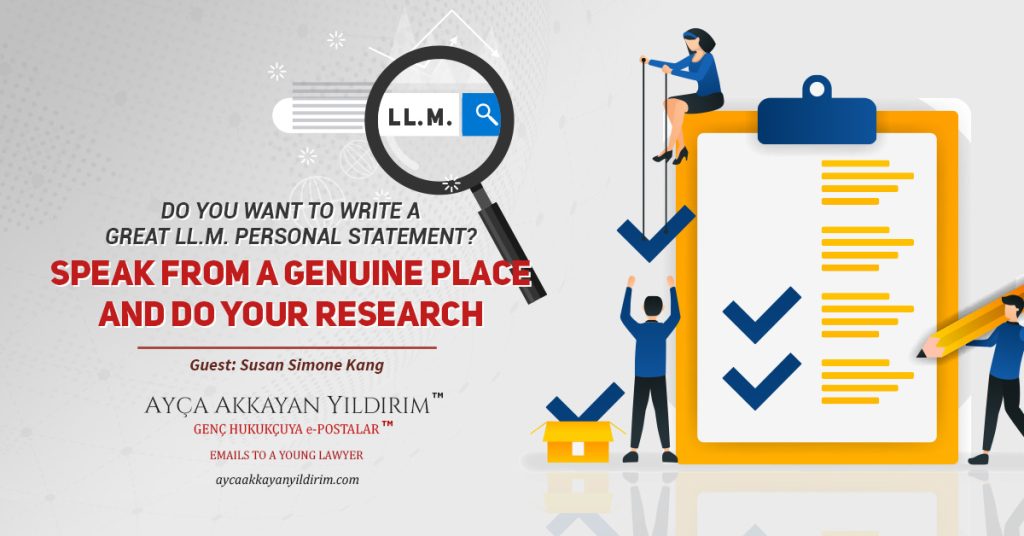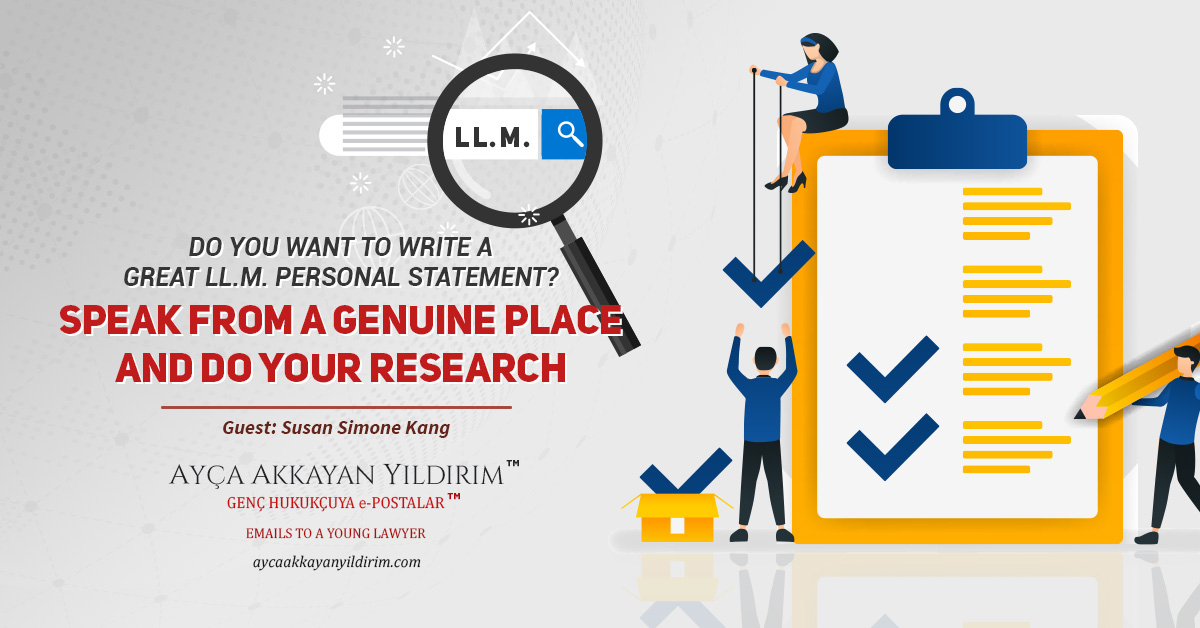Tuesday, April 6, 2021


Date : April 6, 2021
To : Young Lawyers
Re : DO YOU WANT TO WRITE A GREAT LL.M. PERSONAL STATEMENT?: SPEAK FROM A GENUINE PLACE AND DO YOUR RESEARCH
INTERNATIONAL LL.M. PROGRAMS: BOSTON COLLEGE LAW SCHOOL, NEWTON, MA, USA
Susan Simone Kang, Director of Graduate Legal Education and International Programs, thank you for taking the time to answer my questions that might be on the minds of prospective LL.M. applicants from Turkey. GHK
GHK: Professor Kang, as globalization continues to reshape the landscape of the legal practice, what is the value of an international LL.M. from the United States from the viewpoint of a civil-law-trained lawyer? What makes attending Boston College Law a unique experience?
SSK: Civil law-trained lawyers add to their skillset and insight when they add the perspective of a common-law education, especially one in the US. The skill of weighing different sources of law, consideration of precedent on risk assessment, and providing innovative solutions to clients based on likely court outcomes are part of the flexibility of a US legal education. The US relies on codes, but it also places value on judicial interpretation, thinking “on your feet” and negotiating. A US legal education is practice-oriented, and you will be exposed to methods to deepen all of these skills.
GHK: Could you briefly describe some of the qualities that an ideal candidate for the LL.M. program at Boston College Law School might have? Is there anything, in particular, that might make an applicant especially appealing to the admissions committee?
SSK: Our Committee values diversity, and each year, we try to ensure that our candidates come from different legal professions, specialty areas, and geographic and cultural perspectives. In this way, all of our students benefit from the different legal systems that are represented by our candidates, which range from recent students to seasoned practitioners. While a great applicant is difficult to describe concretely, our best applicants demonstrate knowledge of the programs and faculty at the university. This shows us that they are doing their diligence to identify the connection between their interests and BC areas of expertise.
GHK: When is the earliest you start receiving applications? When is the best time to apply, and is there any benefits to applying early?
SSK: Our academic year is mid-August to late May, and we take applications on a rolling basis. It makes good sense to keep your options open and apply as early as possible, but keep in mind if you are pressured to respond to an admission prior to April 1st, and you did not apply early admission, this should be a flag. If you are seeking an F-1 visa, I would not recommend applying past May unless you have special circumstances because it can become difficult to obtain an F-1 visa in time.
GHK: How do the numbers — such as an applicant’s language score and GPA — fit into your process? How much weight do they carry? Do extracurricular activities play a significant role in applicants being accepted?
SSK: We look at applications holistically, so while we do have a minimum TOEFL of 100 or IELTS of 7, if your score is between 90-99, or between 6.5-7, we will often consider the total application and make an admission conditional on our Insights and Foundations programs, which prepare our candidates with additional legal English support. I know this English minimum is higher than other schools, but the positive side about this is that our bar passage rate for LLM students is between 50-75% each year. In terms of extracurricular activities, they do make a difference! I will give you an example: a student who volunteers mirrors our motto: “Men and Women in the Service of Others” Boston College values community members who recognize a well-rounded person gives back to their community and demonstrates character.
GHK: Could you offer any general advice regarding letters of recommendation? Who would be the best person to write an LL.M. applicant’s recommendation letters?
SSK: If you are a recent graduate of law school, then you will be relying on Professors and Internship Supervisors, and if you are further along in your career, then the Managing Chair, Senior Partners or Chief of your department make excellent referees. I have also been occasionally surprised by a letter of recommendation from a satisfied and grateful client, which makes an amazing letter! The bottom line for any good recommendation is that the person knows you well enough to cite an example of why you would be a valued member of our community.
GHK: Could you offer any advice on the best way for an LL.M. applicant to write a resonant personal statement? Any personal statement anecdotes of mistakes you would like to share with us so that our applicants from Turkey don’t make the same mistake?
SSK: Thank you for asking. I imagine that some of the hardest (and disqualifying) statements to read are the ones that are so generic they could be written for any school. If there is any place where you spend the most time, it should be in your personal statement. Please speak from a genuine place, and please do your research about our concentrations, Centers and faculty. If you want to participate in an aspect of our academic experience, say what that is and why. I realize that the LSAC system makes it easier to apply to multiple schools at once, but make sure you are matching your statement to the right school- it’s totally fine to see strengths in more than one, but make each statement uniquely tailored for their correct purpose. I have an anecdote of a candidate that copied our website word for word and put it in their statement. I’m glad they did their research but please use your own words!
GHK: Could you please tell us a bit about the merit or need-based scholarships that Boston College Law School offers? Will the current state of the economy after the COVID-19 pandemic affect the number of scholarships given out?
SSK: A US legal education is expensive, and Covid has made it worse. I wish it weren’t the case. But after our rigorous application process, if you have an admission, then we want you. That means we do our best to provide merit-based scholarship, without need for an application. 97% of our students receive significant scholarship. We maintain a list of scholarship that LLM students can apply to, and we update it regularly. We also have an additional fellowship at the Clough Center for Constitutional Democracy that is on application and it provides an additional $6,000 scholarship.
GHK: What is student life like? When international students are not studying or taking classes, what types of activities might they engage in?
SSK: After putting in a full effort of studying and class, quality of life is a key Boston College Law experience. We seek a balance for our students in readings, reflection and developing bonds with classmates. Since you are in class with JD students for most of your year, you could easily have a JD best friend as an LLM! Students love to socialize, enjoy good food and entertainment and decompress after committed studying. Some students are curious about the Boston College Football team, which is often broadcast on national television. Campus can be high energy during those events! On the Law School campus, we do not encourage a hyper competitive environment in the classroom. Your strength comes from the knowledge that you have developed an excellent education and you can be secure in that knowledge. I know this as a practicing lawyer for 10 years, the BC Law graduates who become my work colleagues at the firm were of very good character and very highly skilled.
GHK: Lastly, I now would like to ask about working in the States after an LL.M. Could you inform us about legal employment opportunities and the job market as far as international LL.M. students concern? Are there any employment opportunities in the States available to Boston College Law LL.M. graduates?
SSK: We do have legal employment opportunities, and these usually come after a period of time in the year after the LLM. I will nominate several students to intern for certain professionals throughout the US, and this is usually the tipping point that engages law firms to think of LLM candidates for jobs. For more information on this, I would encourage you to reach out to me, and I can share our networking plan for international students.

2 Yorum
I would like to profoundly thank Ms.KASAP, Ms.KAHVECİ and Ms.AKKAYAN-YILDIRIM for their great effort on presenting the knowledge of LLM applications given diverse experts. Your efforts are much appreaciated and enlights the quest lying ahead of the prospect applicants. However, I would like to draw a point on something else. I personally enjoy a lot reading “Guest Bio” of each expert. The section informs about interesting law graduate careers. These might be an exemplar and inspiration especially for one who is willing to have a career in academic field. Ms. KANG’s bio is so impressive in particular.
Thank you all again for being part of this amazing project.
Dear Kerem, thank you very much for your kind words! As a first generation member of my family in the US, I feel a strong connection between my work and my affinity toward lawyers around the world, and I have dedicated my career to helping others who now want to do the same, sharing, I hope, not just my training but also the desire to excel. I am so grateful for your kindness. Ramadan Kareem!